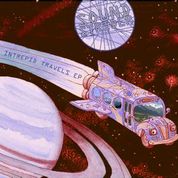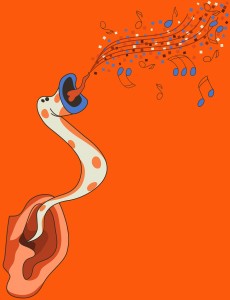Sound Strider (real name, Sam Waks) is an exponent of ‘intelligent dance music’. His music on this 5-track Intrepid Travels EP (released 5th November 2013) has been couched in descriptions I struggle to understand, electronic music not being something I listen to a lot. I really should listen to more, as some of it appeals to me, whilst other stuff leaves me cold. So, versed only in The Chemical Brothers and some electronica from the 1970s, I approached with interest, the cover art having instantly intrigued me.
What appealed to me, even before listening, are the ideas behind the concept. Electronic ambient sounds fused with psychedelia promises to bring the past and the future together in some sort of mind-expanding hybrid out in space. As for intelligence, Waks has explored worlds beyond reaching oblivion on the dance floor. Spoken word samples and voice effects add another dimension to keep our interest; some discordant notes actually add interest, too.
Going for rhythm rather than melody, I won’t pretend to know how a lot of these sounds are achieved. Loops that don’t get bogged down in endless repetition, synths and samples make up the EP, along with inventive percussion, particularly inventive on Betoniere. With beats driving the tracks along, I could easily run or work out to them.
Waks says he was inspired to make this EP after reading The Electric Kool-Aid Acid Test. This is an account by Tom Wolfe of the exploits of Ken Kesey and his Merry Pranksters in the 1960s. This merry band went across America in a gaily painted school bus dubbed ‘Further’, as seen on the cover of the EP, stopping to party with the aid of hallucinogenic drugs and light effects. On the cover, however, the bus is speeding past Saturn. Waks makes the point that Kesey’s movement was a forerunner for the dance parties of today. The tracks have got some psychedelic elements, but it doesn’t invite us to tune in and drop out, so prevalent in the hippie era. It’s more of a stimulant to the senses than an invitation to dream.
Another link to Ken Kesey is the use of one of the track’s titles, namely Menlo Park. It’s surely not a coincidence that Kesey worked as an aide at Menlo Park Veteran’s Hospital, where he also volunteered to participate in studies into certain drugs. Kesey’s experiences as a hospital worker and medical volunteer inspired him to write One Flew Over the Cuckoo’s Nest.
Opening track, The Stakes, is chock full of ideas. These include a rocket launch countdown and the speech from President Lyndon Johnson’s infamous 1964 advertising campaign, called Daisy, when he implores the American people to protect their children and vote for him rather than Barry Goldwater, who was gung-ho about using nuclear weapons.
This music is sometimes very complex, as in Childhood’s End (is this title taken from Arthur C. Clarke’s novel?), a complex array of disparate sounds that somehow manage to dovetail together.
Sam Waks has brought fresh ideas to the electronic genre and been disciplined enough to make each track about the right length. He has lived in many places, been involved as a producer and as a DJ and explored many genres before discovering electronic music as a means to express himself. Like a Merry Prankster, he’s on a journey; his destination is ‘further’.
Soundcloud (https://soundcloud.com/soundstrider/sets/intrepid-travels-ep).







